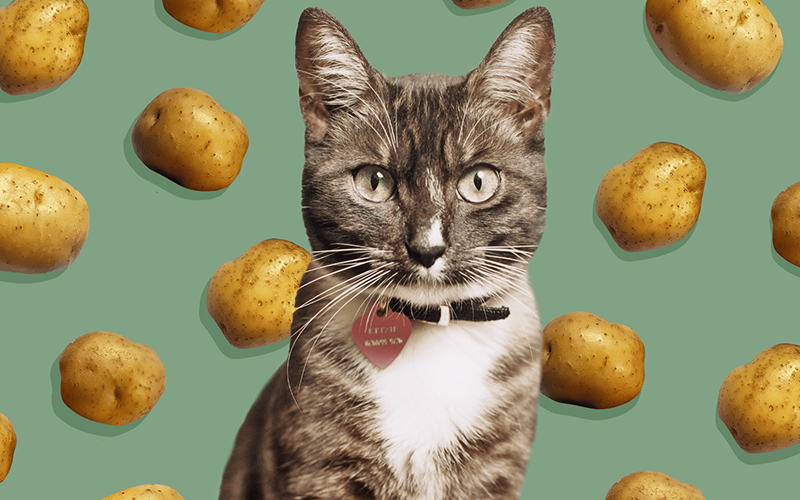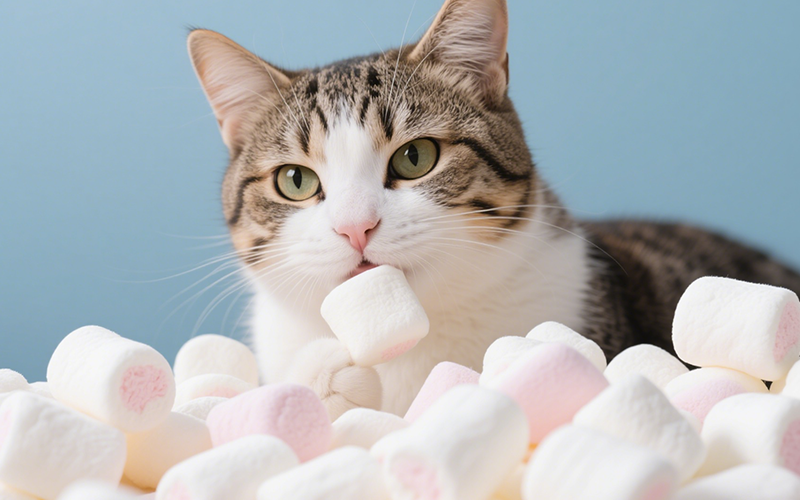Can Cats Eat Sweet Potato? A Guide for Pet Owners
- 27 Feb 2025 14:30
Sweet potatoes are a popular and nutritious food for humans, but are they safe for cats? Cats are obligate carnivores, meaning their bodies are primarily designed to eat animal-based proteins. However, many pet owners wonder if certain plant-based foods, like sweet potatoes, can be safely included in their feline friends' diets. In this article, we’ll explore whether cats can eat sweet potatoes, the benefits and potential risks, and how to prepare them properly if you choose to share this vegetable with your pet.

Can Cats Eat Sweet Potato?
Short answer: Yes, cats can eat sweet potatoes in moderation, but there are some important considerations.
While sweet potatoes are not toxic to cats and can offer certain nutritional benefits, it’s important to remember that they should only be given as an occasional treat or supplement to a well-balanced, animal-based diet. Sweet potatoes should never replace the core of a cat's diet, which should consist primarily of protein from meat.
Benefits of Sweet Potatoes for Cats
Rich in Fiber:Sweet potatoes are high in dietary fiber, which can help with digestion and promote healthy bowel movements. Some cats, especially those with digestive issues or constipation, may benefit from a small amount of sweet potato in their diet.
Vitamins and Antioxidants:Sweet potatoes are a great source of vitamin A (in the form of beta-carotene), vitamin C, and B-vitamins. These nutrients are important for immune function, skin health, and general well-being. Vitamin A supports eye health and tissue growth, while vitamin C has antioxidant properties that help fight free radicals and support the immune system.
Minerals:Sweet potatoes also contain important minerals like potassium and manganese, which are important for regulating fluid balance and supporting metabolism.
Low in Fat:Sweet potatoes are naturally low in fat, which makes them a healthy snack option for overweight or less active cats that need to watch their calorie intake.
Potential Risks of Feeding Sweet Potato to Cats
High Carbohydrate Content:While sweet potatoes are nutritious, they are also relatively high in carbohydrates. Cats do not require carbohydrates in large amounts, and excessive consumption of carbs can lead to weight gain and digestive upset. Cats' bodies are not as efficient at processing carbs as humans or herbivores, so feeding them too much can affect their health.
Digestive Upset:Introducing sweet potatoes to your cat’s diet too quickly or in large quantities can lead to gas, bloating, or diarrhea. Cats' digestive systems are not accustomed to processing plant material in large amounts, so it's important to introduce sweet potatoes gradually and in moderation.
Preparation Matters:Raw sweet potatoes should never be given to cats, as they can be difficult to digest and may cause stomach irritation. Additionally, raw sweet potatoes contain compounds that could be harmful if consumed in large amounts. Always cook sweet potatoes thoroughly before feeding them to your cat.
Allergic Reactions:Though uncommon, some cats may have an allergy or sensitivity to sweet potatoes. Signs of an allergic reaction may include vomiting, diarrhea, or itchy skin. If you notice any of these symptoms after giving your cat sweet potatoes, discontinue feeding them and consult your veterinarian.
How to Safely Feed Sweet Potato to Cats
If you decide to offer sweet potatoes to your cat, here’s how to do it safely:
Cook the Sweet Potatoes:Always cook sweet potatoes thoroughly before serving. You can boil, steam, or bake them. Avoid using butter, salt, or any seasoning, as these can be harmful to cats. The sweet potatoes should be plain and free from any added ingredients.
Peel the Skin:Remove the skin of the sweet potato before giving it to your cat. The skin can be difficult for cats to digest and may cause digestive upset. Cut the sweet potato into small, manageable pieces to make it easier for your cat to eat.
Serve in Moderation:Sweet potatoes should only be served as an occasional treat or supplement to your cat’s regular diet. Keep portions small and make sure that sweet potatoes don’t make up more than 10% of your cat’s daily food intake. Too much can lead to nutritional imbalances or digestive problems.
Monitor Your Cat:After introducing sweet potatoes into your cat’s diet, monitor them for any signs of digestive upset or allergic reactions. If you notice any issues, stop feeding sweet potatoes and consult your veterinarian.
Conclusion: Can Cats Eat Sweet Potato?
In conclusion, cats can eat sweet potatoes, but they should be served in moderation and as part of a balanced diet. Sweet potatoes offer several nutritional benefits, including fiber, vitamins, and antioxidants, but they should not replace the protein-rich foods that are essential for your cat’s health. Always cook the sweet potatoes thoroughly, remove the skin, and offer them as an occasional treat or supplement.
For more personalized advice or if you're ever unsure about your cat's diet, consider using PettureX, a friendly pet health software assistant. PettureX provides 24/7 online consultations, ensuring you're making safe and informed decisions about your pet's health and nutrition.
Related

Marshmallows and Cats: A Puffy Problem? Why Vets Say No to This Sugary Snack
- 22 Apr 2025
Kefir for Kitties? A Veterinarian-Reviewed Guide to Safety, Benefits & Risks
- 22 Apr 2025
The Burning Question: Can Cats Eat Jalapenos? A Comprehensive Safety Guide
- 21 Apr 2025
Cool Temptation: Can Cats Eat Ice Cream Safely? The Vet-Backed Truth
- 21 Apr 2025
Frankly Dangerous: Can Cats Eat Hot Dogs? Vet Explains the Serious Risks
- 16 Apr 2025
A Purrfect Protein? Can Cats Eat Ground Turkey Safely? (Vet-Reviewed Guide)
- 16 Apr 2025
Gritty Situation: Can Cats Eat Grits Safely? Vet Explains the Risks
- 16 Apr 2025
Gravy Danger Zone: Can Cats Eat Gravy Safely? (Vet-Reviewed Warning)
- 16 Apr 2025
Crunchy Query: Can Cats Eat Green Peppers? A Vet-Reviewed Safety Analysis
- 16 Apr 2025
Toxic Temptation: Can Cats Eat Grapefruit? Vet Explains the Dangers
- 16 Apr 2025
